Interview of Dasho Karma Ura (President, Centre for Bhutan Studies)
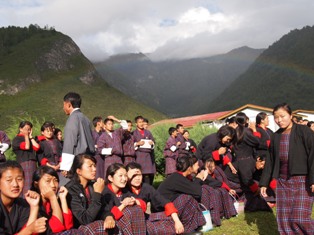
Kyoto University Bhutan Friendship Program 9th mission > about 9th mission
2012. 8.25-9.2 Timph, Bhutan
Member: Shinya Yamamoto, Program-Specific Assistant Professor, Primate Research Institute, Kyoto University
Shirou Ohmi, Associate Professor, Disaster Prevention Research Institute, Kyoto University
Yukiko Uchida, Associate Professor, Kokoro Research Center, Kyoto University
Shun Nishide, Assistant Professor, The Hakubi Project, Kyoto University
Shintaro Fukushima, Graduate student, Kyoto University
Yusuke Baba, Graduate student, Kyoto University
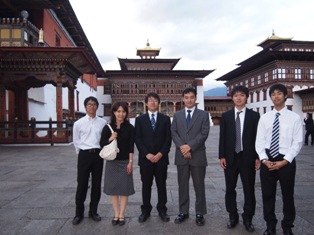
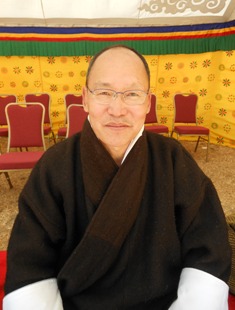
Interviewers:
Yukiko Uchida, Kokoro Research Center, Kyoto University
Shinya Yamamoto, Primate Research Institute, Kyoto University
Shintaro Fukushima, Kokoro Research Center, Kyoto University
Dasho Karma Ura is President of the Centre for Bhutan Studies and GNH Research (Thimphu, Bhutan). He is a graduate of Magdalen College, Oxford and postgraduate of Edinburgh University. He worked for the Ministry of Planning for 12 years before becoming the Director of the Centre for Bhutan Studies from its founding in 1999 until 2008 when he became its President. He organized the concepts of Gross National Happiness (GNH), formulated the nine regions of GNH, and led the survey conducted in 2010 and 2007. He is also a member drafting the first Constitution of Bhutan (2008 enacted). He has been an active scholar, historian, writer, and even a painter. In 2006, he was awarded the ancient and well-known title of “Dasho” by His Majesty, the 4th Druk Gyalpo and in 2010, the title “Druk Khorlo” by His Majesty the King. He is also a famous painter. His paintings can be seen in the renowned iconic Dochula Temple.
Yamamoto
How was your stay in Japan during last winter 2012? What was your impression about Japanese people?
Dasho Karma Ura
Well, I think that the usual observation made by every foreigner is that people are very ordered, highly disciplined, and that we find probably in Japan some of the best infrastructures in the world. But this high standard might also have a human cost: Japanese people seem, at least from an external point of view (like in public transports), to be excessively busy… When you look also at life in university, people seem to have a very busy life and to be much more formal than in other countries like India or Bhutan. Maybe Japanese are sometimes too formal. They could relax a little bit more.
Yamamoto
You mentioned the high level of Japanese infrastructures and its possible human cost. Indeed, in terms of mental health, severe problems are occurring in Japan. For example, annually more than 30.000 people do commit suicide.
Dasho Karma Ura
I think the seriousness with which people take life can sometimes become a too heavy burden. You can also see this in the way people dress so perfectly. There is a lot of work and stress in order to appear so perfect.
Uchida
We are always discussing how to find a balance between economic factors and human factors. Having reached a high economic level, it seems that we still need to find a more peaceful life and improve our human relationships. When we pursue only economic growth, we have then less time for human interactions with family and other people… The severity of the job market for young people in the early stages of their careers is one important cause of a big problem also directly connected to family life: the decrease of birth rate.
Dasho Karma Ura
Yes, I think that we have to preserve and protect about three or four hours everyday when we can be free from formal public life. If work life dominates every hour, either as doing your work or making preparations for it, like going to your office, there is a lack of balance between work life and family life. I think that the search for social status or self-esteem can also become sometimes a burden. When the sense of dignity is too much associated with material achievements (job, income, house and living standards), it becomes very tricky .
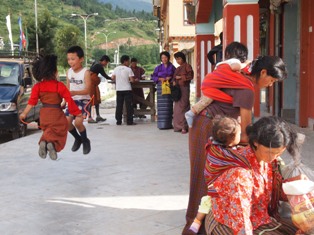 Uchida
Uchida
Yes, the source of self-esteem is very important. This is what is meant with the psychological concept of “the contingency of self-esteem.” If self-esteem is dependent upon contingent elements like job and money, self-esteem will then be contingent too, easily going up and down, and finally this process will be very frustrating and harmful. But there might be “global self-esteems”, relying upon moral values, shared values, and the integration within a community. Such “global self-esteems” seem to be more harmonious than an “area-dominated self-esteem.”
Dasho Karma Ura
Yes, and sometimes you even need an extreme counter-perspective, saying for example that all mundane things are utterly unimportant: this is the ultimate point that Buddhism makes. Of course, there are some basic physical needs that are important to fulfill. But they consist in what is strictly required for life and health. For example, on the hill above here, there are twenty or thirty people, both young and old people, who are fully dedicating themselves to the spiritual practice of mantra. They live in huts. They receive only food and basic necessities. But they value this lifestyle as the highest. From a mundane perspective, they are almost looking like destitute but, in fact, they see their lives as richer and superior to mine. I am busy, slaving, slaving away my life. They are not. Sometimes that sort of extreme example helps a lot of people to find a balance. I envy them every week when I see them.
Uchida
Do they seem fulfilled?
Dasho Karma Ura
They are very fulfilled. You can see this on their face. You can see completely a sort of very calm and contented state of being. They enjoy such a lifestyle which makes far more sense than ours. We are very busy trying to become something.
Uchida
Yes, when we visited a small village in Haa, we met people who looked very wise, very fulfilled and satisfied, even if the infrastructures did not seem very good.
Dasho Karma Ura
Yes, I think as we grow older, we begin to understand. Ultimately, the real infrastructure is psychological. In the sense that if you can access this sort of view and space, freedom of mind, this is the best infrastructure for happiness. Not the road, not the airport. They are infrastructures for generating wealth, but the infrastructure for generating happiness seems to be of different nature.
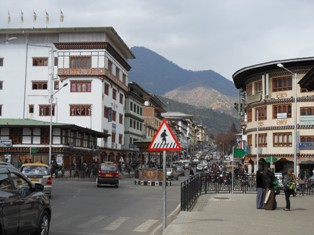 Fukushima
Fukushima
How is urban development in Bhutan? After coming back from Japan, how do you look at Thimphu’s urbanism?
Dasho Karma Ura
I am afraid that Thimphu is not developing well from the point of view of a space that is capable of supporting people’s happiness, social capital, well-being and psychological balance. But there is a big problem because we live in a world where cities are seen as necessary organizations for development. Economically, it is seen as a key to growth, to bring people together, to reduce the cost of services. But this extreme process of centralization is very new.
Fukushima
Yes, Japan has the same problem in fact.
Dasho Karma Ura
Viewed from a wider perspective, the city does not seem to be ideal for human happiness as well as for ecological resilience or sustainable development. Of course, organizations like UN Habitat argue completely the other way around, and say that city urbanism is necessary, because per capita energy consumption is smaller, etc. But I don’t agree, I think that this is just an ex post facto justification for our current development. Modern cities create a severe fracture between men and nature.
From a religious point of view, for example, if you look at the history of Buddhism, it is quite instructive to know that it developed at a point when huge urbanization was also taking place in India. Buddhism was, in a way, a response to the urbanization which brought a lot of doubts about many things that were taken for granted until then. In a way, you can consider Buddhism as a kind of environmental response to urbanization, even though this is not the usual way of seeing Buddhism.
Life in an urban environment first kills animism in you. The divorce from animism is the first step in the attack against you as being a part of your environment because from that moment you begin to see yourself as outside the environment. Materialism seems to be related to urban life. In big cities, it is difficult to rely on anything super-mundane. People are there only talking about material things and the whole energy seems devoted to getting convenience gadgets. The destruction of the environment also undermines the very conditions of contemplative life like in Buddhism.
Uchida
In Kyoto, for example, we have many shrines and temples, so we feel very fortunate to experience such kind of “animism” frequently. Moreover, when the big earthquake and tsunami happened in Japan on March 11th 2011, people felt that we cannot control the natural environment but we have to adjust our lives to it.
In the governmental commission on happiness, we try to have such indices on religious ideas. But, it is really difficult because Japanese government policy tries to separate political aspects and religious aspects. But we try to include in our index a sacred respect for nature.
Yamamoto
In Japan or in America, some people normally do environmental education, like in zoos, for example. In some way, it’s very efficient and very good to know about animals. But from another point of view, it may destroy a kind of religious respect and consideration for other sentient beings because they keep animals in small cages, etc. I heard that Bhutan refused to keep animals captive in zoos. I thought that it was due to the Buddhist mind of Bhutan.
Dasho Karma Ura
It’s not a conscious decision. At the present moment, general opinion would be against it. People are also against the slaughter of animals for their meat. Most of the meat eaten in Bhutan is imported from India because of this. Some communities like northern Bhutanese yak herders, used to kill one or two yaks every year in the past. But still, they would atone for what is somewhat considered a sin. In industrial and commercial farming, there is no such feeling at all. People working for such industry simply see that creature as food, without compassion, just greed.
In Bhutan, traditionally, if we hear that there is a yak about to be slaughtered, we collect money and buy it off. Then it is released back to life. It is called the “gift of life,” which is considered a practice in the path of a Bodhisattva. We always think that getting is more important than giving but we are mistaken. In the action of giving or generosity, the gift of life is the most important, even if it is only for one day.
Living together always means having to concede personal comfort and profit. Socializing means losing something in some areas, but getting overall much more.
Fukushima
Yes, people tend to forget this, especially in cities. In rural areas and traditional agriculture, reciprocity is a fundamental law. But in these days, Bhutanese people told us that many young people come to cities for their own profit.
Dasho Karma Ura
Yes, for job and money. Sure. We also have found that young boys, especially, are not returning always to their villages. The spread of telecommunication facilities, electricity, and feeder roads is supposed to help to reverse that, supposedly. But it is not only because of material infrastructure that people are moving. It is also about power. People like to be where there is influence. That is people’s common illusions. Somehow, there is also the attraction for the crowd. We feel safer when there are more people around. Actually, we have discovered in a survey that within the whole country, people in Thimphu feel the least safe. But people are attracted by cities. It is a mistaken path. Education and media are not very right to communicate and cultivate this sort of a feeling.
The content of current education is not promoting agriculture very well. Agriculture is seen as a hard lifestyle with low income. There is actually some exaggeration in such a view because agriculture is a hard work during the peak season, but afterwards, people have more free time. Moreover, in some sense, agriculture builds true character.
Uchida
Is the government protecting and supporting farmers and agriculture?
Dasho Karma Ura
The public development in agriculture in terms of new seeds, helping irrigation in general is going on, but the investment is not sizable enough.
Uchida
In Japan, there is an agriculture extension office and civil servants are going to villages in agricultural areas.
Dasho Karma Ura
Yes, these sorts of things are happening here also. Extension service is, in terms of manpower, very important. But in my opinion, this is not what people need. Local people have sometimes more appropriate knowledge than some of the extension services. What they really need is investment in irrigation channels. Such equipment is a bit lacking. Farmers cannot easily buy them. To get the necessary amount of money, it is necessary to sell many crops. Everybody in Bhutan can obtain land granted for free by His Majesty the King. But they don’t have big farms, maybe only five acres or so. Production and income are not big enough to buy these expensive agricultural machines.
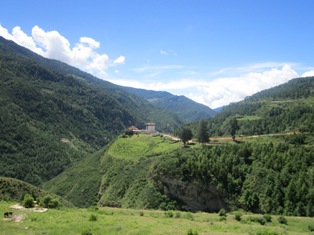 Fukushima
Fukushima
Bhutan has the great objective of GNH. However, individual people tend, like everywhere, to struggle for private profit, like in the GDP model. So how do you promote GNH in Bhutanese society?
Dasho Karma Ura
There are many aspects. Some depend on the government’s budget or policy. Some others, however, depend on local communities and villages. At this level, there are things that only depend on you: personal behavior, motivation, discipline and self-transformation. Without these personal qualities, nothing can be realized.
As citizens, we can try to change government policy, institutional laws, agencies’ principles, but it is a long-term process. For people to come together, express their views, articulate a common project politically, overcome conflicts, it takes a long time.
But, you can also start from the individual. Every day we have twenty-four hours. Within this, we need to work maybe eight or nine hours. Then, there is the sleeping time necessary for health, depending on each people and environment. But then, I think that it is very important to use some of the remaining time to take care of your own body and mind. Physical exercise is generally emphasized but mental exercise should be also better considered. Mental exercise is very important to get a positive outlook for the whole day. There are various ways. Meditation is a good one. Practicing meditation every morning allows you some time when you are not besieged by thinking about habitual things, food, rent, house, arrangement, clothes, etc.
Uchida
We can transcend them?
Dasho Karma Ura
Yes, we have to really transcend them, because otherwise we will go mad after sometime. There are specific techniques in this purpose. Thirty minutes a day is not too much. I think that it is the minimum to do. This can be the most valuable part of your life, when we can feel free from normal emotions or pressures. We can create a lot of space at that moment.
The most fundamental meditation, beyond analysis or objective, just consists in remaining in an open space or emptiness. We realize that everything is empty. In this “meditation without object”, we just cultivate a state of pure awareness, pure presence, empty of any attachment or object.
Then, there is also the “meditation with an object” in order to generate positive emotions like compassion, equanimity, love and joy. We are generally too obsessed with ourselves and it becomes difficult to think about others’ problems and feelings. In this meditation, we consider the difficulties and sufferings of others, including finally all sentient beings, and we generate a strong feeling of compassion.
Another aspect of such meditation is the feeling of gratitude. This fundamental feeling tends to be completely neglected in modern societies. People are forgetting to be grateful to their ancestors, parents, teachers, etc. This problem lies at the heart of the market’s operations. All are commercial transactions with no feeling of gratefulness. People feel that they deserve what they have paid for. Or they even try to cheat, etc. You can also feel gratefulness for every day, appreciative to be alive and healthy, this is very precious. Gratefulness can also be felt for anything we are doing or consuming. I think that this is the essence of Zen in Japan, the essence of Japanese aesthetic. We can draw our eyes’ attention to the aesthetic part.
Moreover, I think that it is important to make an endeavor to be in touch with nature, through a conscious practice of thirty minutes or so. Communion with nature is very much underrated. Although we talk a lot about environment, communion with nature, the daily experience of seeing the sunshine, leaves, or just noticing some insect, is underrated. We talk about preservation in general, but in our daily life, we always prefer a good carpet to a good piece of wood. I think that we have to emphasize communion with nature. It is also very sensuous because nature is very sensuous: colors, light, smells, sounds, contact… There is a deep value in simply walking in nature, in the forest, like you have done here in Bhutan. It is not only a physical exercise. All your senses are being aroused. This is why there is a tremendous difference, I think, between walking on a jogging machine, for example, and walking in nature.
Yamamoto
Yes, in Japan, there are a lot of gym machines for fitness or body-building.
Dasho Karma Ura
The muscular aspect is only one aspect. There are many other aspects to be considered for a harmonious development of personality. I think that the main principle for physical activities is regularity, everyday exercise. Japanese are mostly healthy. But for example, I am myself a cancer patient. So I realized such a concept late in my life. It has an aesthetic and also a therapeutic value.
Then, socializing every day is important. Most of the communication is immaterial. It is just for the sake of communication, the content is not so important. The most important thing between a mother and her child is not what they are talking about, it is just the fact that they are communicating and bonding with each other. The bonding process is taking place at a deeper level than the simply verbal communication.
Socialization implies not only close friends but also the ability to connect with strangers. If not every day, I would recommend to try to talk to strangers on a regular basis. To make such an effort in socialization is important because it represents an expansion of one’s being. In this regard, from a personal point of view, Japanese people might be very stiff, like in public transports…
Fukushima
Do Bhutanese tend to talk with people they don’t know, people they meet for the first time?
Dasho Karma Ura
Not so much, but this is how we can make friends anyway. We all begin our relations as strangers. We have to attempt to extend our being and invite others to do so. From the point of view of well-being and happiness, talking to the other person next to you is better than reading nonsense news. Knowing things that we can never influence, somewhere in the world, is very disappointing. I totally object to this and I don’t watch television for this reason. It is important to be informed about difficulties and struggles in different parts of the world. But if we cannot do anything for them, then it is better to devote our time for what we can really change and improve around us. So in terms of socialization, it is important to be aware of our direct environment and how we can influence it positively with its people.
Yamamoto
In Japanese big cities, there are too many strangers. In such a situation, isn’t it difficult to connect with each other? How about people in Thimphu?
Dasho Karma Ura
No, Thimphu cannot become completely similar to Japan because behavioral patterns and social norms are still very different. But, there are also some new disturbing tendencies, like the emphasis on materiality, judging people completely on the basis of their possessions. Such ways of thinking are clearly anti-Buddhist. We need to go beyond physical appearance and understand also perceptions and feelings. People get more obsessed with clothes and cars. Their minds are restless and frustrated. These are such new phenomena. For example we even begin to see young people taking some tablets of cheap drug. It has paracetamol and chemical opiate mixed. Paracetamol will make you painless while opiate will make you dependent. Last year, there were 350 young people using this. In terms of numbers, it is limited but still, it tells us what kind of society is coming up. It is impossible for a young boy from a village to ever do that because he is engaged all the time in a physically exhausting and mentally fulfilling life. Such small groups of drug users appear in cities where there is even no more intermediate space between buildings…
Uchida
Yes, to get together…
Dasho Karma Ura
Yes, you need to give space for life and plants. But if there are just buildings and buildings, it is the beginning of a very different type of settlement which will ultimately affect human psychology and community relationship.
Uchida
Yes, such kind of city forms a typically materialistic world. Its worldview is always based on comparing oneself to others in terms of possessions or social status…
Dasho Karma Ura
Yes, that is why we need to have access to nature every day. Of course, living standards are important too, and to a certain degree, indispensable for health. But the structure itself of urban landscapes can also strongly affect health and psychology.
Uchida
Have you compared happiness in urban areas and rural areas?
Dasho Karma Ura
Yes, we have compared using the methodology of the GNH index, and urban areas showed a higher value in happiness. However, we load so many variables. For example education and income are higher in Thimphu. But concerning aspects of culture, community and psychology, they are worse in urban areas. It is the net effect, so the urban areas come on the top because the influence of other aspects is higher. Initially in cities, you get a positive effect. But then it becomes dense, competitive and all sorts of new problems arise. The whole thing becomes swamped, and then you will get worse urban performance. This is a non-linear process. True happiness emerges from a set of various conditions.
Yamamoto
In your works, you often emphasize the importance of national happiness, at the community level. But how does the collective level match with individual aspirations to happiness?
Dasho Karma Ura
I think that we have to realize happiness individually. But our road may be connected, it might be communal. That is one way of understanding. Another way is to think about dance. In this example, the individual feels happiness when he or she, is actually lost in the common act of celebration of a group. Actually, some level beyond the self, or of “non-self,” seems necessary to realize happiness.
Unless we are highly realized practitioners of Buddhist meditation, both physically and mentally detached, for most of us, human relationship (family, friends, etc.) is of great importance. How we build a neighborhood and a social network around us is very important. This is totally neglected in modern urban planning. We must live in a place where the neighborhood has some social support. In all life passages, including sickness, we need social support and emotional support. Urban planning only includes government officials, engineers and architects but it need psychologists and cultural anthropologists in order to take care of this fundamental dimension of human relations. At the relative level, the sense of belonging to a place is very important for identity, balance and well-being.
Also, we can know the strength of a community by studying how much time of work people are giving to each other, in a reciprocal way, as well as money or goods. In Bhutan, the average time worked that people are giving to their neighbors is eleven days a year. This number varies according to the topography. It is less in some districts, and in Thimphu, people give very few labor and social support.
Then, in a village, we can ask each individual if they feel victimized by some powerful people, including sexual abuses, crimes, lack of safety. We can also ask people about the intensity and nature of their relationships within the family. We created a normal family index. According to this, we can rank the different places of Bhutan. A good place from the point of view of community is not only depending upon money, health, or governance, but from several perspectives.
Uchida
Contrary to an extreme individualist view, can we say that the very conditions of individual happiness depend upon collective happiness?
Dasho Karma Ura
Yes, eventually the unit of feeling is here, I mean in that sense, it is individual. But, it is always coproduced. For a place like Bhutan, community is presently an important and vital concept. A large amount of the generation of wealth cannot be explained without the participation of the community. For example, in Bhutan, when a villager builds a house, others will come and work to help him out. The house gets bigger than what the householder could have built by himself. This very basic space for life, a house, as the setting for family, upbringing of children, place for storage and even worship, cannot be explained without the solidarity of the community. Also, a lot of properties belong to the community. Land, especially the grazing land, is owned by the community. Schools are also sometimes built by the community. Government just provides materials.
Even if there are a lot issues that can be discussed, man needs community to find happiness. But the hyper-regulation of a group, like in industrial companies may not be very helpful in terms of human needs. There are more fundamental, spontaneous ways to share and bond, even if it is a bit mysterious… Ancient dance dramas and spontaneous theater are giving us some elements to understand how living together with one consciousness can arise.
I have personally noticed in rural communities how they work together, how they joke, etc. A significant part of happiness comes from being together. For example, food eaten together seems to be far more enjoyable than food eaten alone. But the community life is strongly disrupted in the modern world.
Uchida
Yes, and family sizes break down.
Dasho Karma Ura
Family size and the lack of togetherness in the family… I think this is an under-evaluated part of modernization.
Yamamoto
Japan’s global community is getting bigger but the familial unit is getting smaller…
Dasho Karma Ura
Yes, yes.
Uchida
We learned a lot from your talk. Thank you so much for taking your time.
Yukiko Uchida
Kimberly Bowen
2014/08/20